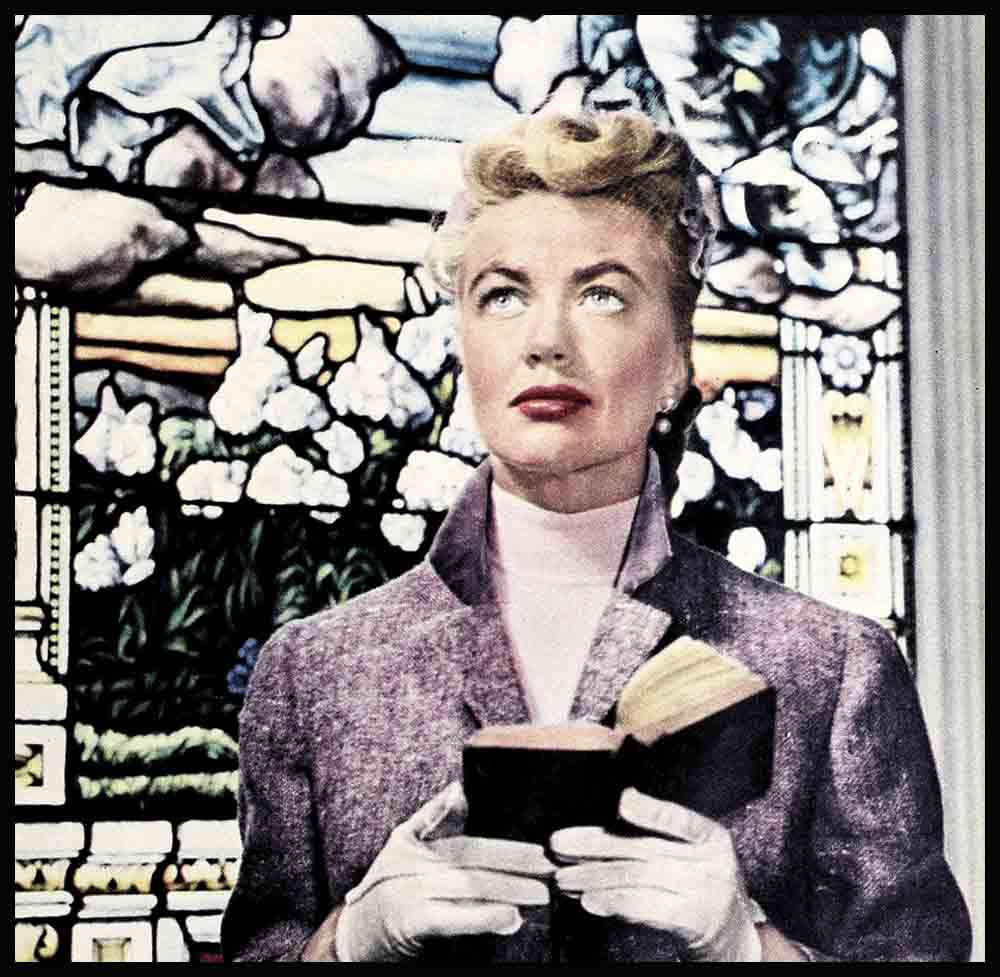
Religion In Hollywood
“In their daily work,” said Bishop Gerald Kennedy of Hollywood’s Methodist Church, “movie people are constantly dealing with strong emotional and dramatic values. And perhaps for this reason, they seem to be more fully aware than the average person of a deep-felt need for divine guidance and spiritual understanding.”
In past years, writers and critics have held Hollywood up as an example of much, if not all, that is weak, sinful or carnal in human nature. Hollywood is usually depicted as a land of tinsel and cardboard, built by pagan gold, and peopled by shallow “characters” whose only motivation is a desire for the fast buck. But today the exact opposite is true. Today the citizens of Hollywood are just as serious, hardworking, virtuous, civic-minded and God-fearing as people in any other town or city across the land.
“Hollywood people are human beings,” says Rabbi Edgar F. Magnin of the Wilshire Boulevard Jewish Temple. “They have virtues in common with all mankind. They work hard, raise their families, build homes and churches, and worship God. And, just like others, they have their faults, too.”
Unfortunately, it is for their non-conformity rather than for their conformity that these golden and glamorous creatures are known. For, as another church leader has pointed out, “Movie people exist in a perpetual spotlight. They live with their shades up. Most other people live with the shades down.”
Undoubtedly there have been times when Hollywood has suffered from the wrong kind of publicity, sometimes deserved, sometimes not. In a community where more than 400 correspondents and 50 photographers constantly elbow each other in their efforts to gather “hot” movie news, this is perhaps understandable. Nevertheless, it is true that most Hollywood people are quite normal in their desires for a home, children, and a reasonable amount of emotional as well as financial security, which means spiritual peace of mind. And while national church membership recently reached a new record high of 60.9% of the total population, the Hollywood figures are slightly higher. showing 61.3% to be affiliated with some church organization.
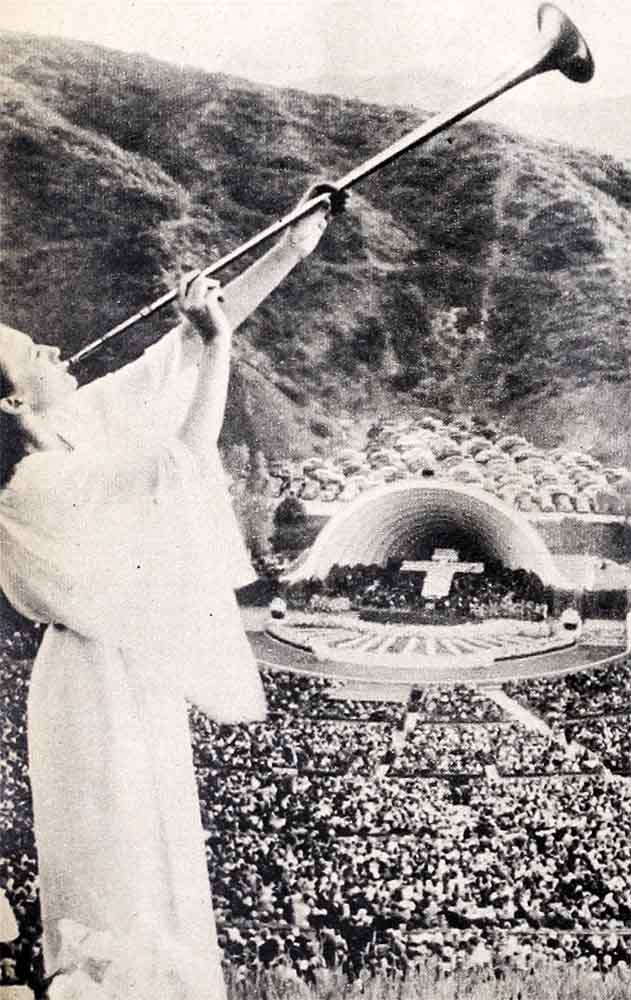
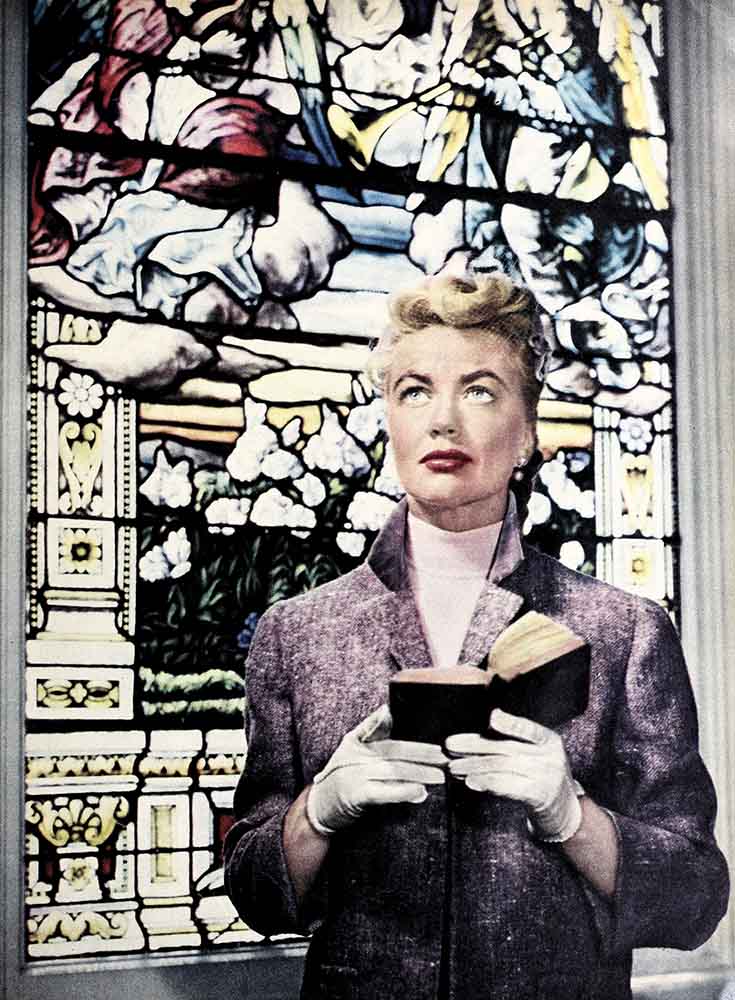
Hollywood has never been a nightclub town. This is a fact that many visitors discover, to their surprise. In the yellow pages of the telephone book. for example. a total of 58 night clubs are listed. But the same book gives listings for 1.087 churches. A few of these are representative of such lesser-known faiths as the Vedanta Society, The Sky Pilot Revival center, I Am Accredited Sanctuary, and the Self-Realization Church. But a very large percentage are churches of the major denominations which have many affiliations across the country and throughout the world.
A great number of Hollywood’s churches are imposing in appearance and modern in design. The First Presbyterian Church of Hollywood has the largest congregation of that denomination in the United States. The Wilshire Boulevard Jewish Temple is justifiably proud of a history in Los Angeles that dates back more than 100 years. And the new Mormon Temple, a massive Mayan-style building standing on twenty-five acres, is the largest and most magnificent of the ten Mormon Temples in the world.
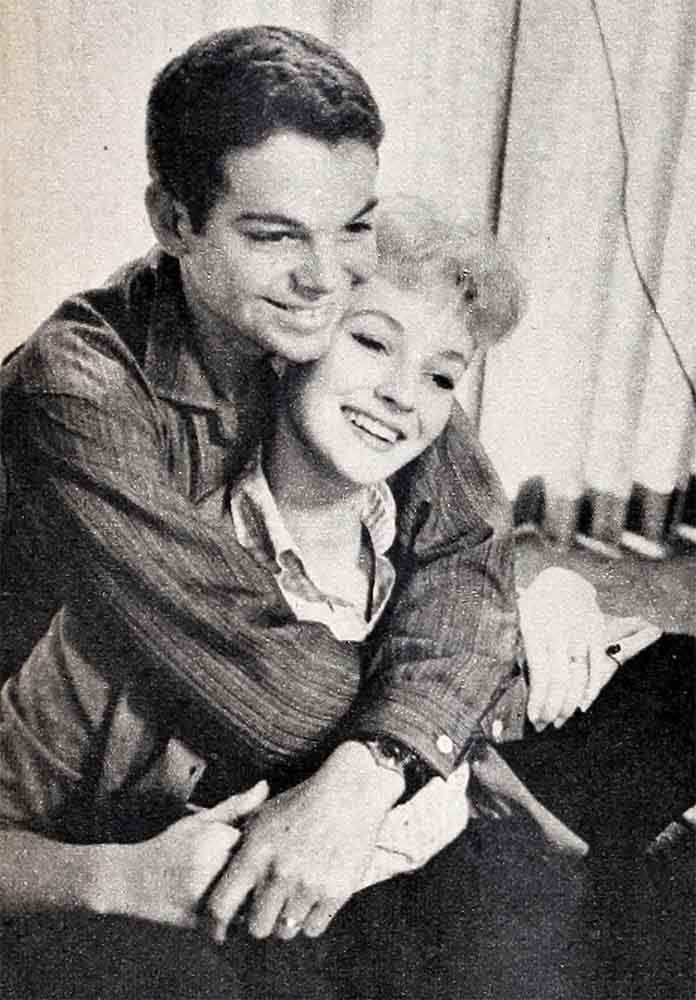
But despite these encouraging figures, the question of divorce and other unconventional behavior in Hollywood is bound to be raised. “How can they be so religious,” comes the concerted cry from a thousand Main Streets, “when they’re always divorcing people to marry other people?”
Divorce, however, is not peculiar to Hollywood. The percentage of divorces in Hollywood is no larger than in New York. The difference is that in Hollywood the people suing for divorce have names that make news, and so it is that every day’s headlines seem to carry some fresh report of one star or another going to Reno, Las Vegas or Mexico.
The really amazing thing that is revealed by a study of religion in Hollywood is the fact that people who are generally so temperamental and so emotionally unstable, people who have usually come up the hard way and taken enough knocks to drive the love of humanity out of one’s heart forever, are actually more deeply emotional than people whose lives are not subjected to these fantastic strains and stresses. It would seem to indicate that the more worldly we become, the more we realize the existence of Someone greater than ourselves. The more powerful we become, the more humble we become because we understand more than ever how fleeting are material rewards.

Jeff Chandler is a good example of this. over at the Wilshire Boulevard Temole they will tell you that Jeff is unstinting in his religious and charity work. ‘’His Services are always available,” they say. “Whether it be a fund-raising campaign, a charity bazaar, or any other worthy cause.” But, although he does go to Temple on Jewish High Holidays, Jeff is not a regular church member.
“I believe that a man’s religion is in the way he lives,” says Jeff, “and has nothing to do with the four walls in which we pray. I believe in the sincerity of all forms of worship. I have respect for the other man’s religion, and for his right to worship God as he sees fit. My wife, Marge, is a Protestant, and this has never at any time been an issue between us. As for my religious views, they can be summed up in the words that are part of Christ’s sermon on the mount: ‘Whatsoever ye would that men should do to you, do ye even so to them.’ This, of course, is the Golden Rule. I try to live by it.”

Richard Widmark is a man who has worshiped in many churches, but he says that he is not an official member of any congregation or faith. In a devotional mood, it has been his custom to drop in at any church whether it be Presbyterian, Catholic or Mohammedan mosque. Says he, “I think God hears you wherever you care to tarry to think about Him.”
Dick admits that he grew up in an atmosphere of mixed religious beliefs. “My father was a Lutheran, my mother a Christian Scientist, and her mother a Catholic. The result for me was confusion.” As he grew up, Dick searched for the true religious belief in one church after another without finding a completely satisfactory answer. Then one day, in a time of worry and anguish, the way became clear for him. “To put it very simply,” says he, “I turned to God. Since then I have tried to get in touch with Him daily. For many years there has never been a night when, as my head touches the pillow, I have not turned to prayer.”
Rock Hudson, too, has a deep and abiding spiritual faith without being a member of any particular church. Rock is a very sensitive man, and at times he is quite introspective. He is constantly searching within himself, and seeking for true spiritual meanings. Rock and I have had many talks of a serious nature. I’ll always remember one remark he made in a moment of thoughtfulness. Said Rock, “I cannot understand how it is possible for anyone to look at a flower and still deny the presence of God.”
Janet Leigh and Tony Curtis are not members of any formal religious group, yet they are truly devout in their attitudes and philosophies. Says Tony, “I try to reflect my religious principles in the way I live and do my daily work.” Says Janet, who is deeply studious, “To me, God represents a search I must make, not a goal I have achieved.”
Janet was born into a Presbyterian family. She has studied and been stimulated by Unitarianism; she has read Christian Science with deep devotion. She has found inspiration in all three of these, but not the final answers. Says she, “I must always go on seeking.” And, as most people know, Tony grew up in the tenement districts of New York, and was confirmed in the Orthodox Jewish faith.
Have the differences in their religious backgrounds ever been a problem in their marriage? “Not once,” says Tony, shaking his head seriously. “Janet and I have always tried to live with tolerance for the rights and privileges of each other. And this goes for religion as well as every other phase of our married life. To me, the whole thing boils down to a matter of honesty. When you are completely honest with yourself and the other person, then there can be no room for the least bit of religious intolerance.”
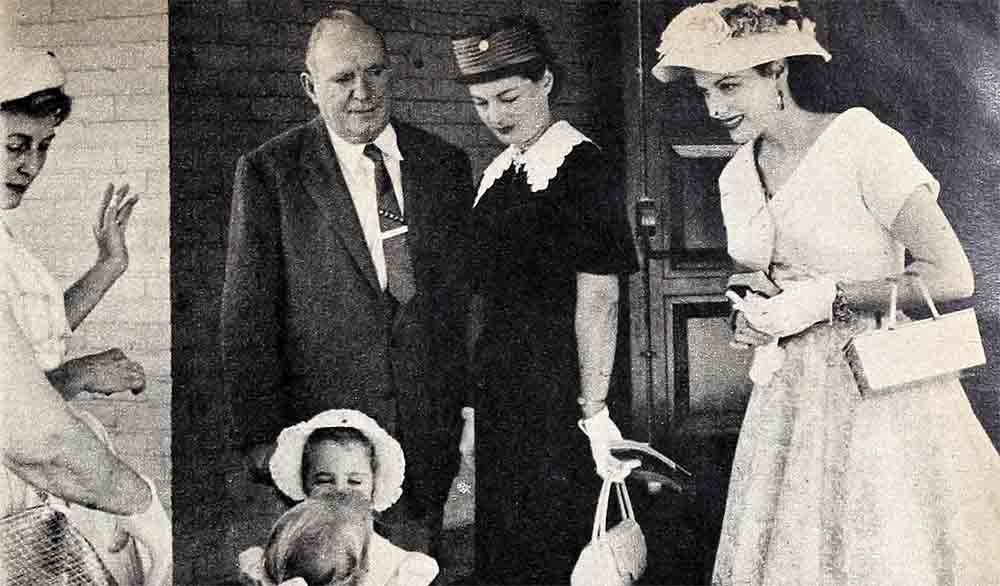
This liberal attitude is reflected in other Hollywood marriages of mixed religions, such as with Debbie Reynolds and Eddie Fisher, and Patti and Jerry Lewis. Some have said that Debbie and Eddie’s marriage was long postponed because of religious differences, but those who are close to them vow that there is not an ounce of truth in this. Perhaps for this reason both Debbie and Eddie have been reluctant to discuss religion in any way. To one reporter who recently pressed the question Debbie would only say, “Both Eddie and I believe in God.”
Both of these young stars come from religious families. Debbie has attended the Protestant Church of the Nazarene, while Eddie is of the Orthodox Jewish faith. While Debbie was growing up she attended Sunday school regularly, and she has a deeply religious turn of mind. Later, when she was older, she used to go to Sunday Services in other churches just to learn how others worship God. Before she and Eddie were married, Debbie went to Services at a Jewish Temple with him. “I found it a beautiful and deeply moving experience,” says she.
In the past, Debbie has said that religion could never be a problem in her marriage. “I have no prejudices against any religion,” said she. “I have been brought up to feel that in the eyes of God we are all equal.” Now there is a strong possibility Debbie will accept her husband’s faith for herself and her children.
To Patti Lewis, who is Catholic, and Jerry, who is Jewish, their religions, though different, have become a joyous daily experience. Just like everything else in their lives, these two share their religions with each other and with their sons. “Sometimes we take our boys to one church,” says Jerry, “and sometimes to the other. Someday, when they grow up, they can choose which church they will belong to. But for the present, when they are asked, they simply say, ‘We are Catholic and Jewish.’ ”
In this spirit of sharing, Jerry always wears a Catholic St. Anthony medal around his neck. This was given to him by Patti, and Jerry says he prays to him often. “St. Anthony is Patti’s patron saint,” Jerry explains. And then adds with a twinkle in his eye, “Patti lends him to me sometimes.”
Jerry is convinced that God wants us all to have as much happiness as we can find, and He does not expect us to be perfect. “Most of all,” says Jerry, “He understands us in all our faults and imperfections.” And with the twinkle still in his eye, Jerry tells of an incident that occurred on a Sunday morning not too long ago.
“I had been in one of my mean moods,” he says, “the way I can be sometimes. And so Patti and I had a few sharp words between us. When Patti returned from church I said to her, ‘Well, did you talk to the Lord, and tell him all about me?’
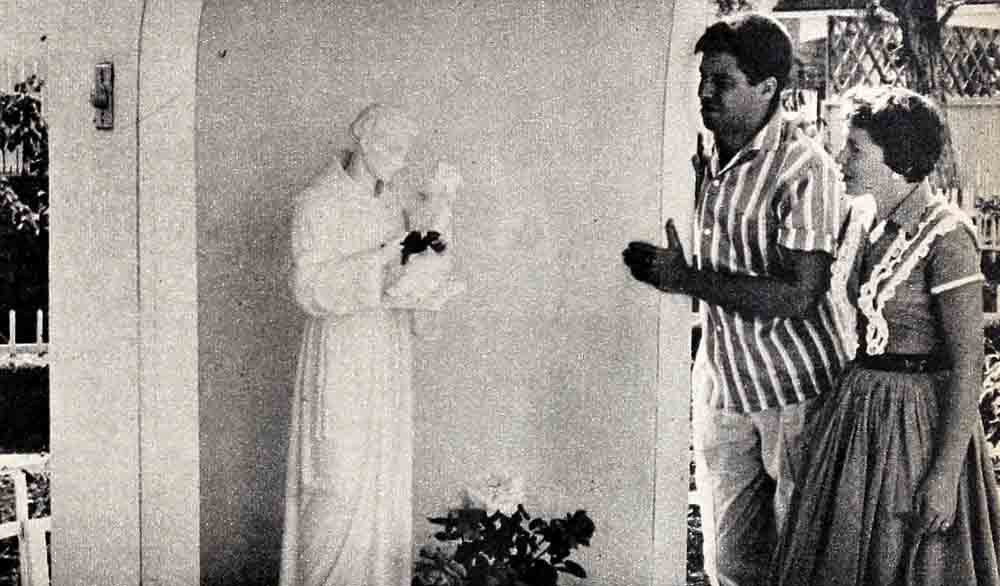
“ ‘Yes,’ said Patti, ‘I did.’
“ ‘And did you tell Him that I was mean and despicable?’
“ ‘Yes, I did that,’ said Patti. ‘But He told me He’s got great patience with you.’ And then she added softly, ‘And I guess I should, too.’ ”
In Hollywood, as elsewhere throughout the Christian world, many have turned to religion for comfort, inspiration and peace of mind. Joan Crawford, Ginger Rogers, Joan Caulfield, Marie Wilson and Doris Day are among the stars who have studied the teachings of Christian Science. And some of them have found here the religious answers they were seeking. After a long and serious illness, Ann Sothern took instruction and became a Catholic. Jane Wyman, too, after the unhappiness of her marriage, has turned to Catholicism and has found solace there. “Jane’s so at peace with herself,” a friend said recently. “She seems to have found real happiness.”
There are other stars whose religious convictions were formed at an early age, and grew with them into maturity. Ann Blyth, a Catholic, is one of these. “I was born into my religion,” says she. “And it has been with me through my nights and days ever since. It has been a fountain of strength and comfort to me through every illness in my family, and through every stressing moment of my life.”
Dorothy Malone is another Catholic whose religious path has been straight and true, and whose faith has been unwavering. “Religion has been much more than a part of my life,” says she. “It would be more correct to say that my life has been a part of my faith.”
Dorothy also says that Catholicism has solved every problem she has ever had. “Prayer is very much a part of my daily life. It has helped me meet many problems and crises. This doesn’t mean that my prayers are automatically and quickly answered. Maybe the answer is a long time Corning. And I’ve had to work very, very hard for it. But in the end, if I worked hard enough and prayed hard enough, it usually turned out right.
“To me, religion is a very personal thing. I have built my life around it, and I believe in living up to my religious tenets. For my religion embodies what I think and what I believe in. Thus I am against divorce for myself. For others, who believe in it, perhaps it is the right thing. But I believe that marriage should be a one-time, all-time contract that involves the important words, ‘Until death do us part.’ ”
Kim Novak’s attitude toward her religion is a combination of blind faith and intelligent curiosity. “I was always asking, ‘Why, why, why?’” she says. “And I still do. In a religious sense I still have much to learn. Much to understand.”
Kim was born of a Catholic mother and father, and she grew up in close association with her church. But she says that she didn’t gain any real religious appreciation until she was in her teens. “I think I was fascinated by the beauty of the church, and perhaps a little awed by the pageantry of it all. But I didn’t really understand it.
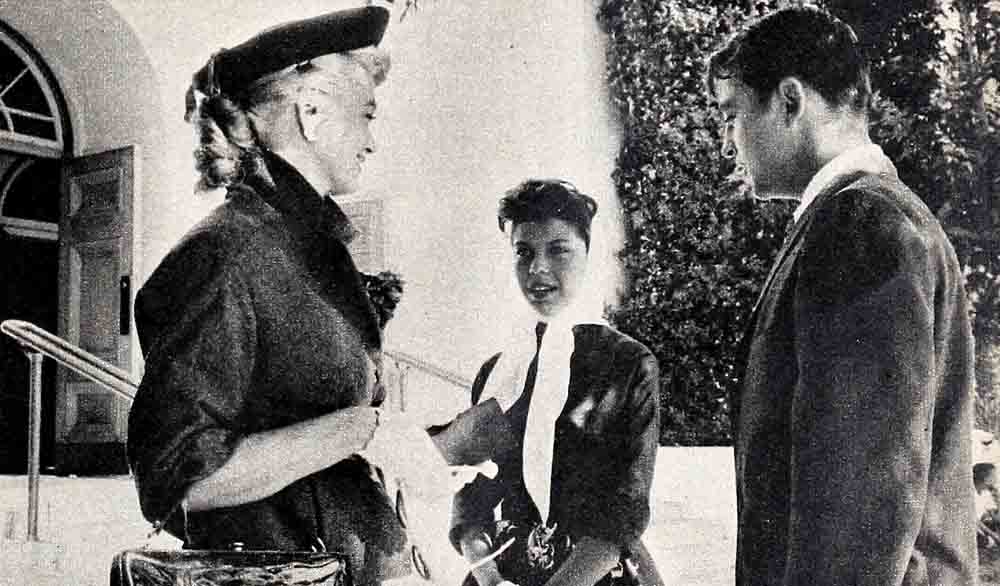
“I particularly remember my first communion. It was so beautiful. My dear grandmother had made my dress for me, all of embroidery and white lace, and it made me feel akin to the angels. But it wasn’t until after my confirmation, when I was sixteen, that I really became aware of the glories that can be found in a nearness to God.
“At that age I used to take my questions and my problems to Father Connors of the Church of the Blessed Sacrament in Chicago. My mother and father were unfailingly patient and understanding with me, but somehow Father Connors could always provide the answers I sought. He combined a fatherly wisdom with a true religious spirit.”
Nick Adams, who worked with Kim in “Picnic,” tells this revealing story: “While we were shooting the picture in Kansas we used to pray together every night. We found a little church near by, and after the day’s work we’d slip away from the others. Kim would put a scarf over her hair, or sometimes she’d borrow my baseball cap. And there in the dim-lit sanctity of that quiet country church we’d pray for help and strength and guidance. Once as we knelt there side by side, I was tempted to glance at her lovely profile, at her lips as they moved softly with silent words of devotion to God. I remembered the words Kim had once said to me, ‘Nick, everybody needs someone they can depend on.’ And as I watched her quiet serenity, I knew that in God, Kim had found that Someone.”
Are prayers answered? Without hesitation, Russ Tamblyn says a definite, “Yes!” Russ is a Mormon, as are Terry Moore, Laraine Day and Rhonda Fleming. Russ’s wife, Venetia, is an Episcopalian, and consequently they were married outside the Mormon Church. But Russ says they both live according to the precepts of the Mormon religion.
“Venetia and I say a prayer together every night,” says Russ. “I have done this for many years now; my whole family prays together. And most certainly our prayers were answered last February when my younger brother accidentally shot himself in the eye with a B-B gun. The B-B lodged in his eyeball, and when we rushed him to the hospital the doctor shook his head. He said it was very serious, and my brother would probably lose the sight of his eye. We knew then it was all in the hands of our loving Father, and so we all prayed almost constantly after that. Two days later we had our answer when our doctor told us my brother’s sight would be saved. That was a moment of thanks and spiritual rejoicing for all of us.”
Russ says a daily prayer “for strength.” He is convinced that these have helped him “many, many times” in his work.
“But this doesn’t mean,” says Russ, “that I always get everything I pray for. I don’t. However, when this happens, I believe that what I prayed for was not right for me, or else God would have given it to me. Then I can go on working toward other goals without wasting time feeling sorry for myself.”
Jane Russell is one of the most honest and forthright stars in Hollywood, but these days if you ask her about her religion she is inclined to be noncommittal. She feels that the story of her spiritual life has been told too many times. Says Jane, “I don’t want people to get the idea that I’m using God for publicity purposes.”
Jane’s religion has always been more or less a family affair. They all attend Friday night prayer meetings at the Russell family chapel in North. Hollywood. The chapel’s a simple, unpretentious building and was hand-built by Jane and her four brothers. It stands in a cloister-like glade of eucalyptus trees on eight acres of jointly-owned Russell property, surrounded by the homes of Mom Russell and each of her four sons.
At prayer meetings, a solid family nucleus is formed by the Russell boys—Tom, Ken, Jamie and Wally—plus their wives Nola, Lois, Pam and Mary Lou. Plus their fourteen children, Valerie, Garry, Heidi, Geraldine, Gregg, Ty, Daniel, Robin, Christopher, Pandora, Jennifer, Jay, Bruce and Jody. Plus Jane and her three, Thomas, Tracy and Buck. Plus an assortment of other relatives, friends, neighbors and visiting clergymen that occasionally boosts attendance to anywhere from fifty to a hundred.
The main chapel room is about sixty feet long. The walls and carpet are a soft shade of green, the ceiling is gray. Many of those who attend sit on low cushions grouped around the cross-shaped lectern. On the wall is the “Prayer Board,” a blackboard where those in trouble list their names, and for them prayers are said. As each problem is solved, the person steps forward and says, “Thanks. I’m fine now. You can take my name off the board.”
Mom Russell usually conducts the meetings of hymn-singing and Bible-reading. But in her absence Jamie or one of the other boys takes over. And afterwards everyone troops upstairs to a coffee-and-recreation room called the “Eagle’s Nest.” Here the discussions, usually of a religious nature, can go on for hours. For as Mom Russell points out, this is not a church meeting or a substitute for church. It is a Bible study group, whose beliefs are clearly stated in these written words: “We Believe in the Holy Bible Cover to Cover.”
Jane has been constantly criticized for being insincere in her religious beliefs. Nothing could be further from the truth, nor does anything get Jane angrier than such accusations. In explaining how she can play the sexy roles she has made famous and still be deeply religious, Jane will tell you, “I think that life is sort of like a tapestry. To get the right pattern, you need all kinds of different color threads. Well, people are the same way. Each of us is given a job to do and told to do it in our own way. And if we do the work He set out for us to do, all the threads finally make a tapestry that can bring beauty and comfort to everyone.”
But whether it’s a Friday night service at the Chapel in the Hills, with its green walls and carpet, its piano, its Bible-reading conducted by Jane’s mother and brothers; or whether it’s a Solemn High Mass on Sunday morning at the church of St. Martin of Tours, a Saturday service at the Jewish Temple on Wilshire Boulevard, Services in the Mormon Church at Pacific Palisades, or in the Presbyterian or Episcopal houses of worship, they all have one thing in common: on the day of the week that is set aside for their members to worship God, the pews are packed.
Hollywood will still make headlines because the people who live in Hollywood are people who make news. But behind the headlines, behind the tall hedges of the wealthy or the stucco plaster walls of the less luxurious apartment houses, on one day a week the citizens of Hollywood have one thing in common with the rest of the world. And on this Christmas as on any other Christmas, when the bells toll and the thoughts of mankind are on peace on earth, goodwill toward men, Hollywood, too, joins the pilgrimage to God that begins with the words of that lovely old hymn, “Oh, come all ye faithful, joyous and triumphant. . . .”
For it has always been true that, the more man gains of this world, the more he hungers for and needs the peace found only in the world of the spirit.
THE END
It is a quote. PHOTOPLAY MAGAZINE JANUARY 1957




